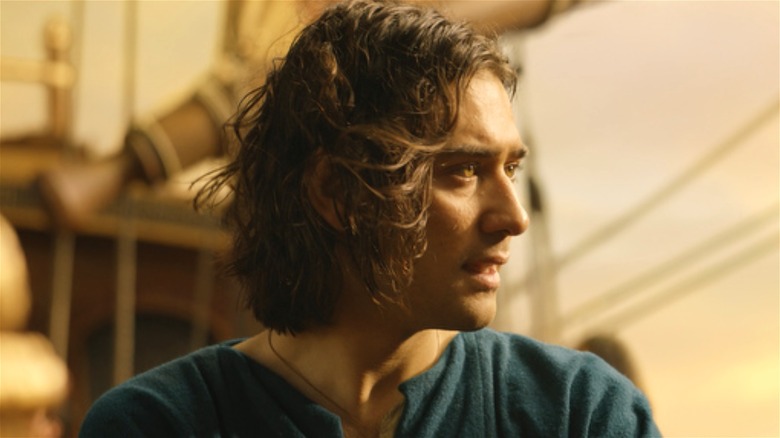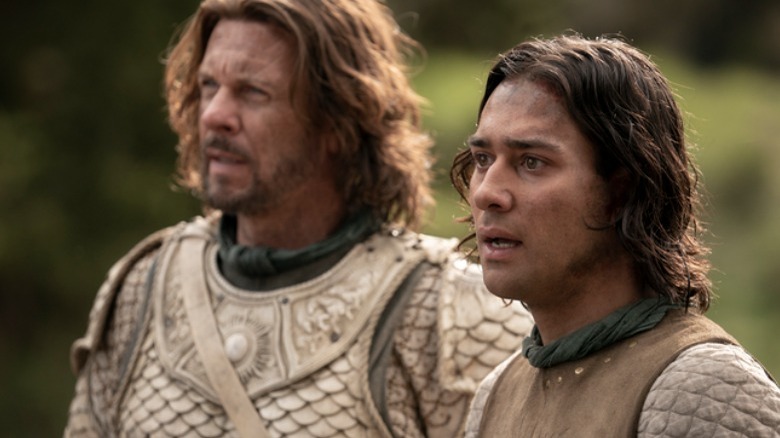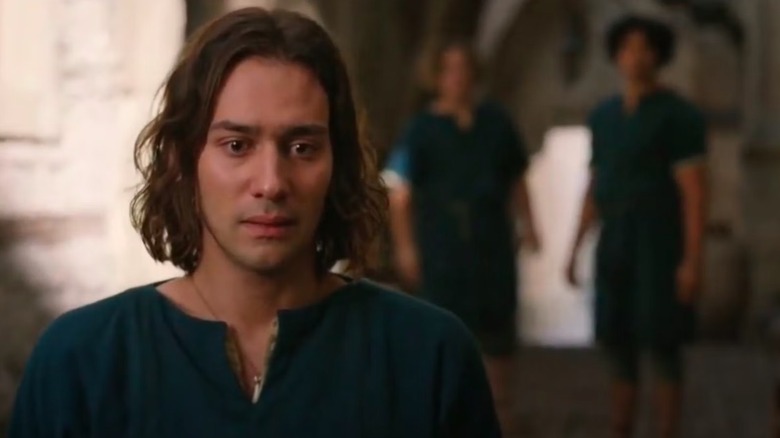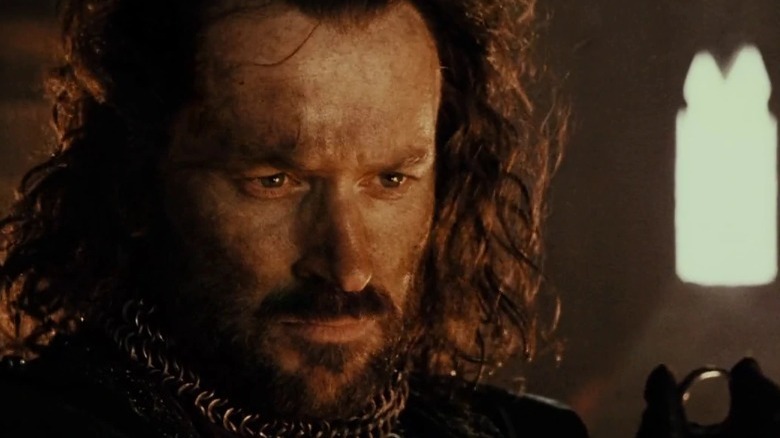How The Rings Of Power Foreshadows Isildur's Fate In Mordor
This post contains spoilers for episode 6 of "Lord of the Rings: The Rings of Power."
The latest episode of "The Rings of Power," aptly titled "Udûn," which means "hell" in Sindarin, culminates in a reveal that is both sudden and shocking. While fans of the show were aware that a part of the Southlands would soon be transformed into Mordor, the manner in which the events are triggered takes even the mighty Galadriel (Morfydd Clark) by surprise. Adar's (Joseph Mawle) grand plan is thus revealed: he had always meant to use the hilt of Sauron's sword to trigger the eruption of Orodruin, or Mount Doom, which would render the Southlands barren and create a hellish realm for the orcs.
The creation of Mordor, especially Mount Doom, is key to the events that will transpire in the Second and Third Ages of Middle-earth. Apart from serving as a lair for Sauron, Mordor is the site of the great battle between Sauron's forces and the Last Alliance of Elves and Men, in which evil is destroyed to usher in momentary peace. As seen in Peter Jackson's "The Fellowship of the Ring," Isildur cuts off Sauron's finger along with the One Ring, which leads to the storming of the Black Gate and the temporary fortification of Mordor (although this effort is abandoned after Gondor is afflicted with The Great Plague).
As a lot transpires in "Udûn," it is easy to overlook how the show sets up Isildur's (Maxim Brady) arc and the role he will eventually play in the future. Isildur's presence during the creation of Mordor and Mount Doom obviously foreshadows the eventual downfall of men, as Elendil's son will fall prey to the power of the One Ring. This will mark the beginning of the end.
Filling in the gaps with the power of foreshadowing
J.R.R. Tolkien goes into tremendous detail about the events that plague Middle-earth through the ages, while taking a historical approach to flesh out key characters who play a role in the sprawling saga. While we are aware of the weight of Isildur's eventual refusal to destroy the One Ring when he had the chance, little is known about the emotional state of the man himself.
Brady, who plays a young Isildur, recently talked about the challenges of creating an arc for the character, despite the awareness of his fate in the end. Brady also said that we will witness Isildur "grow, become a man, [and] become heroic" throughout the series, along with "certain elements of darkness pull[ing] him down." Although Isildur is just an angsty youngster eager to prove himself at the moment in "Rings of Power," the latest episode sows seeds of character growth and foreshadowing that provide context for the events that are about to transpire and the man he is about to become.
A key moment of mirroring between the past and the present is when Isildur charges into the battle to see his father, Elendil (Peter McKenzie), wounded. Queen Regent Míriel (Cynthia Addai-Robinson) senses his restlessness and urges him to gallop towards the scene; although Halbrand saves Elendil at the last minute, Isildur rushes to his father's side, overcome with the fear of losing him. Interestingly, during the War of the Last Alliance, Elendil's death at the hands of Sauron will trigger a burst of bravery and grief-fueled rage in Isildur, leading him to cut off Sauron's hand with the One Ring. The dramatic irony of Isildur being unaware of his own actions that will alter the future of Middle-earth weighs heavy, amongst other things.
The past is never past
After the battle, Isildur hangs out with his buddies Valandil (Alex Tarrant) and Ontamo (Anthony Crum), who ask him what he thinks about the Southlands. "I like the mountains," he says, a sentiment immediately subverted by the volcanic eruption at the end of the episode. Moreover, Valandil tells Isildur that the two are soon set to travel near Mount Doom to search for runaway orcs, which is bound to be an especially dangerous mission after Mordor's creation.
This side-quest might have some troubling significance: per Tolkien's saga, Isildur's youngest child is also named Valandil, who was the only one to survive the Disaster of the Gladden Fields. This is important, as he was the one to receive the Shards of Narsil after Isildur's death and continued the line of men that Aragorn descends from. The fact that Isildur's youngest son is the namesake of his best friend could mean that the "Rings of Power" will see Valandil die a tragic death, which will spur Isildur to name one of his sons after him.
And the future holds doom
Speaking of Isildur's future, we know that the One Ring will betray him when he least expects it. However, the manner in which this connects to past trauma in "Rings of Power" explains why the episode spends so much time talking about his mother's death. Isildur clearly harbors pain in his heart, as his horse senses this repressed emotion, which might play a role in his path to becoming a doomed warrior. Earlier, he tells Galadriel that his mother drowned — sadly, history will repeat itself as Isildur will breathe his last in the River Anduin. Although he doesn't drown, the Ring abandons him while he's wading through the choppy waters, and the orcs kill him with arrows.
These pieces of foreshadowing Isildur's fate — and all the fates of these valiant characters fighting to rid the world of evil — add just another layer of tragedy to preexisting Tolkien lore, and make the experience of watching "The Rings of Power" so much richer.



